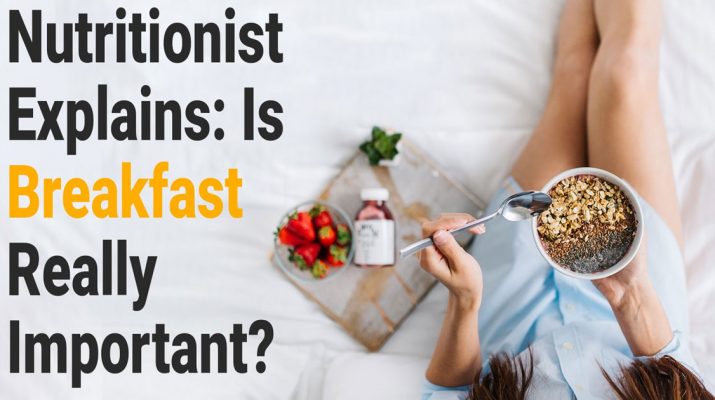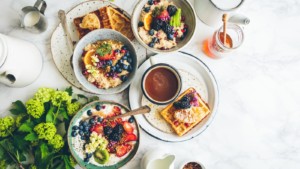Science can be conflicting over whether you should partake in what many people tout as the most important meal of the day. Do you find yourself grabbing coffee or tea and skipping breakfast most days? Have you skipped believing you’ll lose weight by consuming fewer calories?
Mornings can be hectic for some families, so maybe skipping isn’t always intentional. You could be doing your body more harm than good though. Not eating a meal on a regular basis can have some adverse effects on your physical and mental health.
First, let’s look at where the saying received its start and the expertise behind the words.
Breakfast Is The Most Important Meal Of The Day
We’ve all heard this saying. It isn’t a marketing scam put out by cereal companies; the saying is a quote from the best-selling nutrition author and renowned nutritionist Adelle Davis. She’s often called the Queen of Nutrition, and her books have redefined wellness for many.
Her books brought light to a growing concern during the Great Depression when many Americans didn’t have enough to eat. She highlighted the importance of nutrition, vitamin deficiency, and continued to do so in her books that followed.
Her actual saying covers all three of your main meals, assigning a hierarchy to your eating habits that tapers as your day progresses.
“Eat breakfast like a king, lunch like a prince, and dinner as a pauper.”
In simple terms, that first meal should be your heaviest meal. Keep in mind that she doesn’t give you free reign or suggest you should eat whatever or however much of any certain food. Adelle wasn’t a vegetarian or vegan, but she didn’t eat a fatty, traditional American breakfast either.
You will likely recognize many of her quotes on nutrition, and these are sayings we still repeat today. Pass them on to your children, grandchildren, or to the next generation. They will hold merit for many years to come.
Your Food’s Quality Matters
Another title she carries is the Queen of Optimal Eating. Her advice focuses on quality of food over quantity as well as proper nutrient balance. Her ideal morning meal isn’t a sugar-laden bowl of cereal or pastries masquerading as morning fare.
Adelle Davis ate how she preached. A normal morning for her included granola (she invented it), thin pancakes, or healthy wheat germ muffins with walnuts. She might have included her special Pep-up drink too.
What she ate gives us a deeper perspective of where her advice holds merit today. She didn’t believe in eating processed foods, chemicals created in a laboratory, or empty calorie beverages. Much of what Americans eat today falls into one of those three categories.
Still, should we skip if all we have to eat in our home is processed junk? Or should we redefine our breakfasts into healthy choices that fit Adelle’s ideals?
What Science Says About It
Quality matters in every meal or food we put into our bodies. Few people can argue that processed food is healthier than or as nutritious as real, fresh food. However, does this add scientific merit to your breakfast being the most important meal of your day?
Maybe. It depends. No. Yes.
Unhelpful advice, we know. The current response from the majority of the scientific community on breakfast benefits is mixed at best. The factors they talk about are your current health, including your weight and goals.
Benefits do exist on both sides for weight loss and health, but the scientific community isn’t ready to throw their support behind your morning meal being any more or less important than lunch and dinner.
Right now scientists are continuing to delve deeper into the types and quality of foods. Whether they change current opinions will depend on the outcome of the studies, but many nutritionists believe scientific views will alter the moment traditional morning fare goes up against real, healthy whole foods.
Let’s face it. It’s hard to say breakfast benefits anyone when it consists of huge amounts of saturated fat, little to no vegetables, even fewer good fats, and gobs of simple carbohydrates. If we take Adelle’s healthy approach instead, it’s harder to refute the importance of eating in the morning.
Should We Skip To Lose Weight And Save Calories?
While this seems like a pure logical yes, the truth reveals a hard, fast no. When you’re trying to lose weight, calories in and out matter, but it’s only part of the big picture. Studies show that people who skip their morning meal consume fewer calories, but they typically gain more weight and have higher BMI scales.
On the other hand, a study that had people alter their morning habits showed little difference. However, people weren’t offered a healthy eating plan or guidelines in the study. More studies with stauncher food control, meal plans, and guidelines might paint a clearer picture. We don’t know what participants chose to eat on the study to determine the true breakfast benefits for weight loss and control. (2)
Does Skipping Benefit Your Overall Health?
This one is a flat no. You’re removing an entire meal that you could’ve packed full of healthy foods. Those foods contain the vitamins, minerals, and macronutrients your body requires to function. Why would you starve yourself of the basic building blocks your body requires to function?
Furthermore, scientific evidence shows you’re at a greater risk for certain diseases and metabolic conditions when you skip your morning meal.
Eating Breakfast Benefits:
• Reduced type 2 diabetes risk
• Lower heart disease risk
• Lower risk of hypotension and hypoglycemia
• Improved metabolism
• Mood stability
• Enhanced cognitive function
The morning meal can enhance areas of your life science can’t measure, and this is especially true for families and couples. That togetherness can bring you closer and strengthen relationships. The mental boost this offers can go a long way to promoting overall well-being.
Speaking of mental well-being, did you know partaking in a morning meal could reduce anxiety and improve mental clarity? Most adults who skip the meal complain about physical sluggish feelings, being grumpy, and having an overall slowed thinking process. (5)
The 48% of the adults in the poll admit to skipping to their morning meal on a regular basis too. That leaves little room for thought. Why are they repeating the same mistake every morning and continuing to skip? Why not enjoy a small or to-go type breakfast?
Morning Meal Ideas
Your morning meal doesn’t need to be extravagant. You also can and should think outside the cereal box or standard bacon, sausage, toast, potatoes, and eggs.
Do you find it difficult to eat after waking? Grab a handful of nuts, seeds, or homemade trail mix instead of settling for coffee or tea. Also, if you work out in the morning, you will need to refuel your body with more than caffeine or water.
QUICK, HEALTHY, AND EASY RECIPES
• Oatmeal
• Fresh fruit
• Yogurt
• Homemade granola or Muesli
• Low-sugar dry cereal with a plant-based milk
• Whole-wheat toast with 100% fruit preserves
• Overnight oats
• Chia pudding
• Avocado toast
• Soy-based scrambles
• Soy- or mushroom-based meat replacements
If you have more time, you might enjoy some healthier versions of classics, such as vegan French toast or a chickpea pancake found on our site. Many recipes are vegan, vegetarian, and friendly to a low-carb lifestyle.
Need a portable option? Try making your own granola or protein bars. The majority of recipes make 12 servings, and you can store them in the fridge or freezer. If you don’t have time to bake, you can also pick up pre-made bars. Just be sure to read the labels and pick one without fillers or junk.
Foods To Limit In The Morning
• Sugary cereals
• Pastries, including the toaster variety
• Doughnuts
• Biscuits, unless homemade with whole grains
• Processed foods and meats
• Fruit juice
It’s okay to treat yourself on an occasion here and there, but you shouldn’t feed your body these foods on a daily basis.
Fruit juice might surprise you, but it’s mostly a fast-acting sugar that will spike and crash your system. It also lacks fiber. Choosing complex carbohydrates will gradually raise your blood glucose levels without the side effects. If you must drink juice, use a small serving and sip it.
Final Thoughts On Breakfast Benefits
Food should nourish your body, and your body needs fuel in the morning. Every meal you eat is important to your overall health. Skipping mealtimes has a large impact on your well-being today and later in life.
Eating in the morning fuels your body for the day. You don’t have sugar crashes that lead you to eating whatever is in your sights. It reduces your risks for diabetes, and it allows your body to reach nutritional recommendations of vitamins, minerals, and macronutrients.
Morning fare can be quick, easy, and nutritious. Even a handful of nuts and seeds or a piece of fruit is more beneficial than eating nothing at all.
Enough scientific and dietary evidence supports the importance of eating breakfast, especially if you’re eating whole foods. Keep up the good work if you’re already starting your morning off right.
Not eating breakfast yet? Start small with quality foods to fuel your body, mind, and soul.


